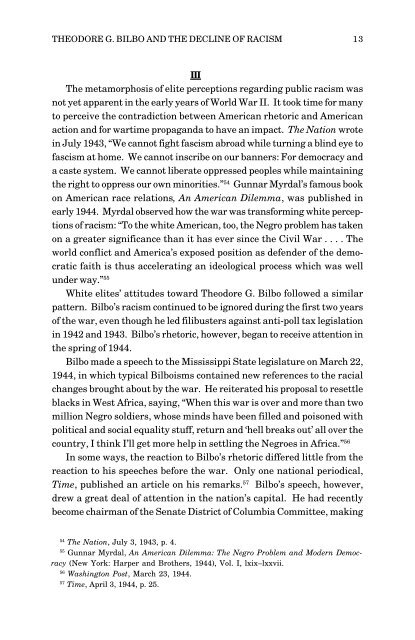bilbo
bilbo
bilbo
- No tags were found...
Create successful ePaper yourself
Turn your PDF publications into a flip-book with our unique Google optimized e-Paper software.
THEODORE G. BILBO AND THE DECLINE OF RACISM 13IIIThe metamorphosis of elite perceptions regarding public racism wasnot yet apparent in the early years of World War II. It took time for manyto perceive the contradiction between American rhetoric and Americanaction and for wartime propaganda to have an impact. The Nation wrotein July 1943, “We cannot fight fascism abroad while turning a blind eye tofascism at home. We cannot inscribe on our banners: For democracy anda caste system. We cannot liberate oppressed peoples while maintainingthe right to oppress our own minorities.” 54 Gunnar Myrdal’s famous bookon American race relations, An American Dilemma, was published inearly 1944. Myrdal observed how the war was transforming white perceptionsof racism: “To the white American, too, the Negro problem has takenon a greater significance than it has ever since the Civil War . . . . Theworld conflict and America’s exposed position as defender of the democraticfaith is thus accelerating an ideological process which was wellunder way.” 55White elites’ attitudes toward Theodore G. Bilbo followed a similarpattern. Bilbo’s racism continued to be ignored during the first two yearsof the war, even though he led filibusters against anti-poll tax legislationin 1942 and 1943. Bilbo’s rhetoric, however, began to receive attention inthe spring of 1944.Bilbo made a speech to the Mississippi State legislature on March 22,1944, in which typical Bilboisms contained new references to the racialchanges brought about by the war. He reiterated his proposal to resettleblacks in West Africa, saying, “When this war is over and more than twomillion Negro soldiers, whose minds have been filled and poisoned withpolitical and social equality stuff, return and ‘hell breaks out’ all over thecountry, I think I’ll get more help in settling the Negroes in Africa.” 56In some ways, the reaction to Bilbo’s rhetoric differed little from thereaction to his speeches before the war. Only one national periodical,Time, published an article on his remarks. 57 Bilbo’s speech, however,drew a great deal of attention in the nation’s capital. He had recentlybecome chairman of the Senate District of Columbia Committee, making54The Nation, July 3, 1943, p. 4.55Gunnar Myrdal, An American Dilemma: The Negro Problem and Modern Democracy(New York: Harper and Brothers, 1944), Vol. I, lxix–lxxvii.56Washington Post, March 23, 1944.57Time, April 3, 1944, p. 25.


